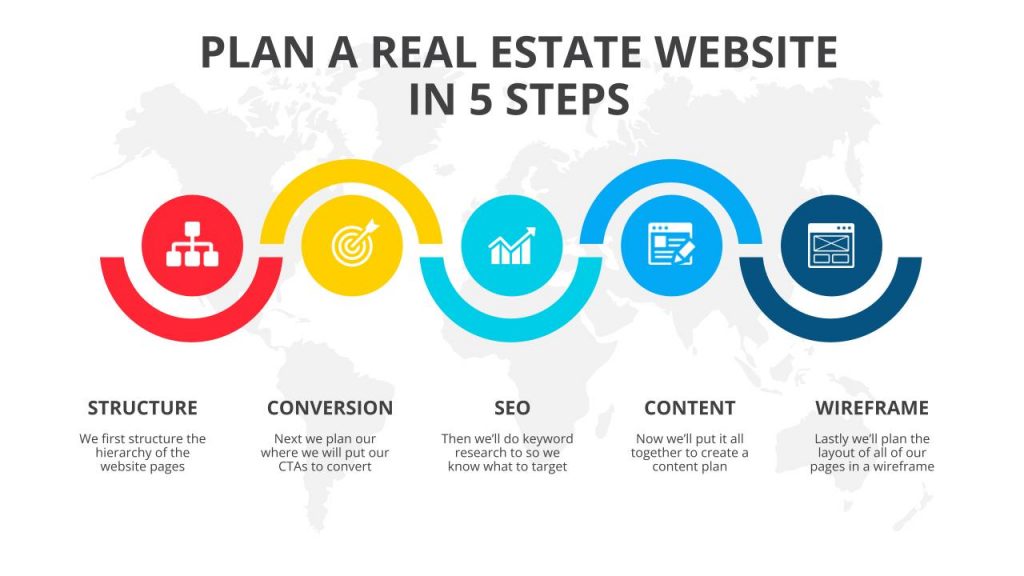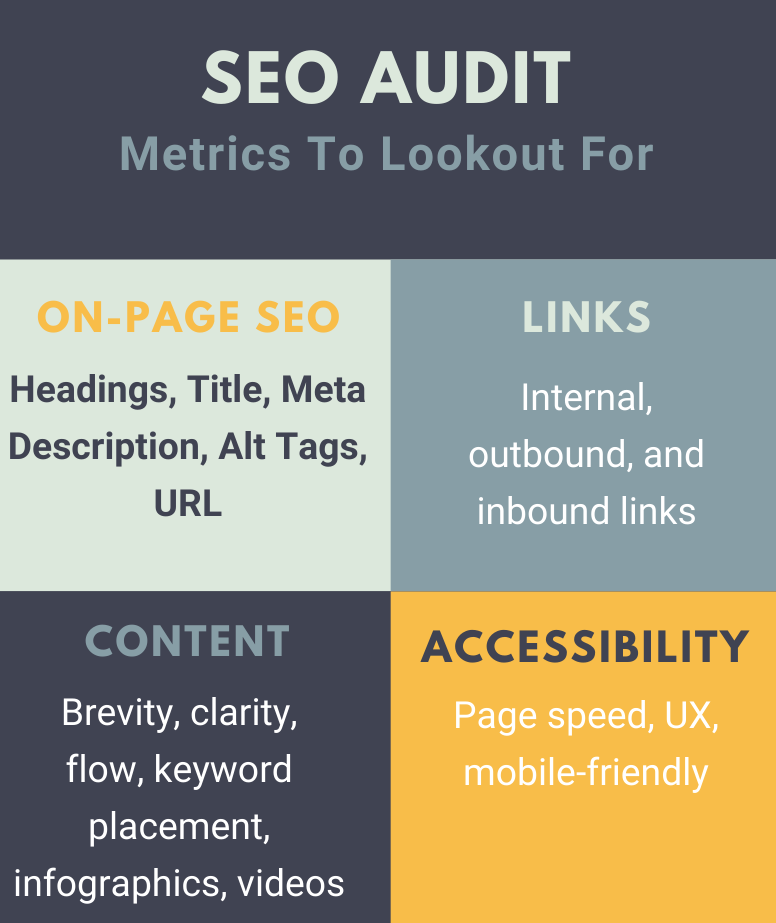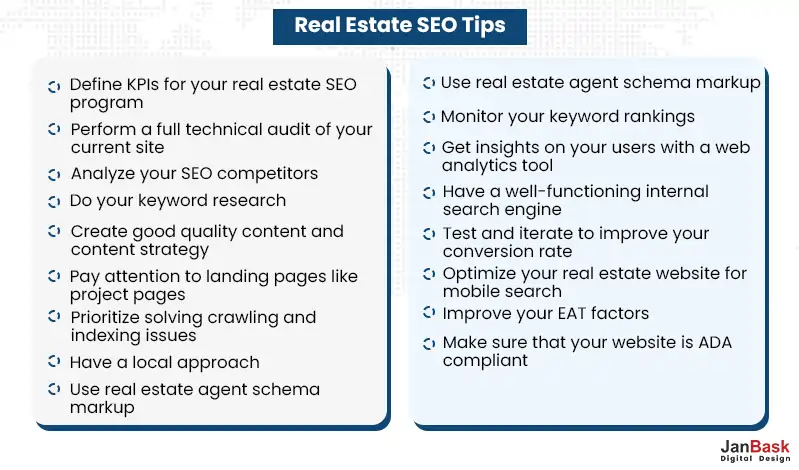Unlock the secrets to skyrocketing your real estate website’s visibility with these top SEO techniques for maximum impact!

Image courtesy of via DALL-E 3
Table of Contents
SEO, which stands for Search Engine Optimization, is a vital tool for real estate websites. If you’re new to this concept, don’t worry – we’ll break it down for you in a way that’s easy to understand. Learning about SEO is like unlocking a secret code that can help real estate websites like yours get noticed by more people!
What is SEO?
SEO is all about making your website more visible on search engines like Google. When someone types in a search term related to real estate, good SEO practices help your site show up closer to the top of the search results. This means more people are likely to click on your website, giving you the chance to showcase your property listings or real estate services.
Why SEO is Important
Imagine you have a fantastic real estate website with beautiful property photos and helpful information, but it’s buried on page 10 of Google search results. Most people don’t look past the first few pages when searching for something online, so having good SEO can help your website climb higher in the rankings. This means more potential clients can find you easily, leading to more business opportunities for you!
Understanding Keywords
What Are Keywords?
Keywords are specific words or phrases that people use when searching for information on the internet. In the world of SEO, keywords play a crucial role in helping search engines understand what your website is about. By using the right keywords, you can attract more visitors to your real estate website.
Choosing the Right Keywords
When selecting keywords for your real estate website, it’s essential to pick ones that are relevant to your content and popular among users. For example, if you specialize in selling homes in a particular city, using keywords related to that location can help potential buyers find your site. Popular keywords with high search volumes are more likely to drive traffic to your website.
Using Keywords Wisely
Once you’ve chosen the right keywords, it’s important to use them strategically on your website. Make sure to include keywords in your page titles, headings, and throughout your content. However, avoid overusing keywords, as this can make your content sound unnatural. Remember, the goal is to create a user-friendly experience while also optimizing your content for search engines.
Optimizing Website Content
When it comes to optimizing your real estate website for search engines, good content is key. But what does good content entail? Simply put, good content is clear, informative, and engaging. You want to provide valuable information to your visitors in a way that is easy to understand. Avoid using jargon or overly complicated language that might confuse your audience. Remember, the goal is to keep your readers interested and coming back for more.
Adding Keywords to Content
Now that you know what good content looks like, it’s important to incorporate keywords into your writing. Keywords are the terms that people use when searching for properties or real estate services online. By strategically placing these keywords throughout your content, you can improve your website’s visibility in search engine results. However, it’s crucial to avoid keyword stuffing, which can make your content sound unnatural and unappealing to readers. Aim for a seamless integration of keywords that enhances the overall quality of your content.
Using Images and Videos
Images and videos are powerful tools that can enhance the user experience on your real estate website. Not only do they make your content more visually appealing, but they can also help improve your website’s SEO. When adding images to your site, be sure to use descriptive file names and alt text that includes relevant keywords. This way, search engines can better understand the content of your images. Similarly, videos can be optimized by including keyword-rich titles, descriptions, and tags. By making your multimedia content SEO-friendly, you can attract more visitors and improve your website’s search rankings.
On-Page SEO Techniques
When you search for something on the internet, the words you see at the top of the search results are title tags. These are like the titles of books that give you an idea of what the page is about. For real estate websites, having clear and relevant title tags is crucial for SEO. It helps search engines understand your content better and makes it easier for people to find your website.

Image courtesy of respacio.com via Google Images
Meta Descriptions
Meta descriptions are small snippets of text that appear below the title tags in search results. They provide a brief summary of what the page is about. Writing compelling meta descriptions is important because they can influence whether someone clicks on your website or not. Make sure to include relevant keywords in your meta descriptions to improve your chances of getting noticed.
Header Tags
Header tags, also known as H1, H2, and H3 tags, are like headings in a book that help organize the content on your website. Using header tags correctly not only makes your content easier to read for visitors but also signals to search engines what your main topics are. This can improve your SEO by making your website more structured and user-friendly.
Link Building
Link building is an essential aspect of SEO for real estate websites. It involves the process of getting other websites to link back to your website. This is important because search engines like Google consider backlinks as a vote of confidence in the credibility and relevance of your website. Let’s dive deeper into what backlinks are and why they matter.
What are Backlinks?
Backlinks, also known as inbound links, are links from other websites that direct users to your website. Think of them as recommendations or endorsements from other sites. The more high-quality backlinks you have from reputable websites, the more authority your real estate website gains in the eyes of search engines.
Building Internal Links
Internal links are links from one page on your website to another page on the same site. They help search engines understand the structure of your website and the relationship between different pages. By strategically linking relevant pages together, you can improve user experience and encourage visitors to explore more of your content.
Using External Links
External links are links from your website to other websites. While it might seem counterintuitive to direct users away from your site, external links can actually benefit your SEO. When you link to reputable sources or websites with high authority, it shows search engines that you are providing valuable and credible information to your visitors. Make sure to choose external links that are relevant to your content and add value to the user experience.
Technical SEO
Technical SEO involves optimizing the technical aspects of your real estate website to improve its performance and visibility on search engines. Understanding these technical elements can help enhance your site’s SEO effectiveness.

Image courtesy of www.propacity.in via Google Images
Ensuring Fast Page Speed
Page speed refers to how quickly your website loads for users. A fast-loading website is crucial for a positive user experience and can also impact your search engine rankings. To achieve fast page speed, you can optimize images, enable browser caching, and minimize the use of plugins on your site.
Making Your Site Mobile Friendly
In today’s mobile-centric world, having a mobile-friendly website is essential. Mobile optimization not only provides a better experience for mobile users but also boosts your SEO rankings. To optimize your site for mobile, use responsive design, ensure readability on smaller screens, and prioritize fast loading times.
Structuring Your Site Well
A well-structured website not only helps users navigate your site easily but also assists search engines in understanding your content. Organize your site logically with clear navigation and categories. Use descriptive URLs and create a sitemap to make it easier for search engine crawlers to index your pages.
Local SEO
When it comes to real estate businesses targeting local clients, local SEO plays a crucial role in improving online visibility and attracting potential customers in a specific geographic area. Let’s dive into the world of local SEO and learn how it can benefit your real estate website.
What is Local SEO?
Local SEO focuses on optimizing your website to rank better in local search results. This is essential for real estate websites that cater to clients in specific neighborhoods or regions. By incorporating local SEO strategies, you can ensure that your website appears when potential clients search for real estate services in their vicinity.
Setting Up Google My Business
One of the key components of local SEO is setting up and optimizing your Google My Business listing. This free tool allows you to manage your online presence across Google’s platforms, including Google Maps. By providing accurate and complete information about your real estate business, such as contact details, business hours, and customer reviews, you can enhance your local visibility and attract more clients.
Getting Reviews
Positive reviews from satisfied clients can significantly impact your real estate website’s ranking in local search results. Encourage your clients to leave reviews on platforms like Google My Business, Yelp, and other relevant review sites. By responding to reviews and addressing any concerns promptly, you can build credibility and trust with potential clients, ultimately improving your local SEO performance.
Monitoring and Improving
As you work on optimizing your real estate website for search engines, it’s essential to track your progress and make necessary tweaks for better results. Monitoring and improving your SEO efforts can help you stay on top of your game and attract more visitors to your site. Here are some tips to help you along the way:

Image courtesy of www.janbaskdigitaldesign.com via Google Images
Using SEO Tools
There are various tools available to help you monitor the performance of your website and its SEO. Tools like Google Analytics, SEMrush, and Moz can provide valuable insights into your website’s traffic, keyword rankings, and user behavior. By utilizing these tools, you can understand what’s working well and what needs improvement.
Tracking Your Rankings
One way to monitor your SEO progress is by tracking your website’s rankings on search engine result pages (SERPs). Keep an eye on where your website appears for different keywords related to real estate. By tracking these rankings over time, you can see if your SEO efforts are paying off and adjust your strategy accordingly.
Making Improvements
Once you have collected data from your SEO tools and rankings, it’s time to make improvements to your website. Look for patterns in the data to identify areas that need attention. Whether it’s updating your content, improving site speed, or building more backlinks, use the data you’ve gathered to guide your decision-making and make the necessary changes for better SEO results.
Conclusion
In conclusion, understanding and implementing SEO techniques can significantly enhance the performance of real estate websites. By optimizing website content, utilizing the right keywords, and implementing on-page SEO techniques, real estate businesses can improve their online visibility and attract more potential clients. Here is a recap of the main points covered in this article.
Recap the Main Points
We started by explaining what SEO is and why it is crucial for real estate websites. Keywords play a vital role in SEO, and selecting the right ones can make a difference in search engine rankings. Optimizing website content with relevant keywords, images, and videos can further boost SEO effectiveness. On-page SEO techniques like title tags, meta descriptions, and header tags help search engines understand and prioritize website content.
Link building, both internally and externally, can improve website credibility and authority. Technical SEO aspects such as site speed, mobile friendliness, and site structure are also essential for optimal performance. Local SEO strategies, including setting up Google My Business and obtaining positive reviews, can help real estate businesses target local clients more effectively.
Lastly, monitoring website performance with SEO tools and analytics allows businesses to track their progress and make necessary improvements. By continuously optimizing their websites based on data insights, real estate businesses can stay competitive in the digital landscape.
Final Thoughts
As you venture into the world of real estate websites and SEO, remember that consistency is key. Continuous learning and adaptation to changing SEO trends will help your website stay relevant and attract more visitors. Apply the knowledge you’ve gained from this article to enhance your real estate website’s online presence and reach a wider audience. With dedication and the right strategies, your real estate business can flourish in the digital realm.
Want to turn these SEO insights into real results? Seorocket is an all-in-one AI SEO solution that uses the power of AI to analyze your competition and craft high-ranking content.
Seorocket offers a suite of powerful tools, including a Keyword Researcher to find the most profitable keywords, an AI Writer to generate unique and Google-friendly content, and an Automatic Publisher to schedule and publish your content directly to your website. Plus, you’ll get real-time performance tracking so you can see exactly what’s working and make adjustments as needed.
Stop just reading about SEO – take action with Seorocket and skyrocket your search rankings today. Sign up for a free trial and see the difference Seorocket can make for your website!
Frequently Asked Questions (FAQs)
FAQ 1: What is the best keyword for my real estate website?
When choosing keywords for your real estate website, it’s important to focus on terms that are relevant to your business and popular among your target audience. Consider terms that potential clients would likely use when searching for properties online. Additionally, think about what sets your real estate business apart and incorporate those unique selling points into your keywords. By combining relevance and popularity with your unique offerings, you can find the best keywords for your website.
FAQ 2: How often should I update my website’s content?
Updating your website’s content regularly is crucial for maintaining an engaging and dynamic online presence. Search engines love fresh content, so it’s a good idea to update your website at least once a month, if not more frequently. This could involve adding new property listings, blog posts about real estate trends, or updating information about your services. By keeping your content up to date, you not only provide value to your visitors but also signal to search engines that your website is active and relevant.
FAQ 3: Can I do SEO myself or should I hire an expert?
Whether to do SEO yourself or hire an expert depends on your time, resources, and expertise in the field. DIY SEO can be a cost-effective option if you have the time to learn and implement SEO techniques. There are plenty of resources available online to help you understand the basics of SEO. However, hiring an experienced SEO professional can save you time and potentially yield better results, especially if you’re unfamiliar with the intricacies of SEO. Consider your budget and goals before deciding whether to tackle SEO on your own or seek professional help.







